Build a brand and you can sell anything. That is the message from two well-known UK farmers that have diversified their businesses and are selling branded farm produce. People don’t buy what you do, but why you do it, that is according to Wilfred Emmanuel Jones and Hannah Jackson, otherwise known as ‘The Black Farmer’ and ‘The Red Shepherdess’.
Both The Black Farmer and The Red Shepherdess are first and foremost a brand, not a product.
They both came from non-farming backgrounds
Often when farmers look to diversify or add value they try to come up with a product and then try to sell it. However these farmers argue that a strong brand is more important.
They both decided to go directly to the consumer
They both came from non-farming backgrounds and worked for free at one stage along their career path to get to where they wanted. In many ways, their stories are similar but they are of two different generations. They both decided to go directly to the consumer to sell their product, bypassing the retail intermediaries. Arguably, The Red Shepherdess had a better opportunity to do this as she started her business in the digital era when communicating to consumers directly was made easier by social media.
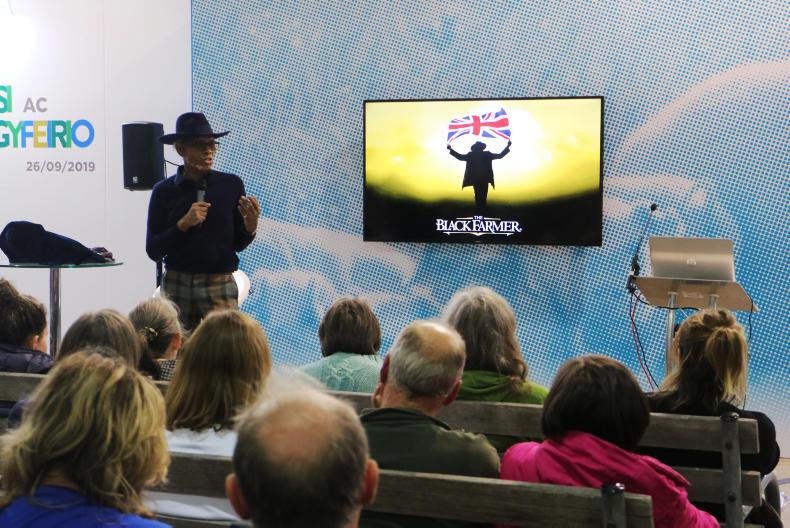
Wilfred Emmanuel Jones - The Black Farmer. \ Odile Evans
Wilfred Emmanuel Jones’ was born in Jamaica, but his family moved to Birmingham when he was an infant. Children raised in his neighbourhood were not expected to do well in life, indeed some of his classmates did end up serving time in prison. By the age of 11, Wilfred had decided that farming was part of his DNA, and he set a goal of buying a farm. From there on out everything he did in life was geared towards being in a position to buy a farm. Wilfred started out by joining the army when he left school at 16, but he said his entrepreneurial personality didn’t fit with the rules and structure of the army. At just 18 years of age he was “dishonourably discharged”. He got kicked out.
I couldn’t buy a farm flipping burgers
So, he went where all “useless people” at the time went; catering college.
“I went to college in the west midlands and loved it. But I couldn’t buy a farm flipping burgers. So I decided I wanted a job as a TV producer and director.”
BBC career
After writing to everyone he could think of in TV, but hearing nothing back, Wilfred decided to work for the BBC security firm for free.
Then he got a job as a cleaner which he did for two years before he was given a three-month contract as a “runner”. Then he became a researcher before moving on to the role of producer and director with the BBC.
“I got to travel the world making programmes about food and drink. I broke in all the big name chefs; Gordon Ramsay, Antony Worrall-Thompson, Brian Turner and James Martin.
“The Oxford-types couldn’t manage these chefs, but I spoke their sort of language, settled disputes out the back.”
Marketing agency
After 15 years in the BBC, Wilfred still wasn’t content.
“The moment you stand still, life goes past you. Those who stand still become a victim of change. At this point I was in my late 30s and I didn’t want to miss any opportunities. So I left the BBC with enough money to pay my mortgage for just three months.
An entrepreneur makes a friend of uncertainty
“Fear makes people prisoners to what I call ‘survival mode’. Living with fear is difficult.
“An entrepreneur makes a friend of uncertainty. Because if there is one thing I have learnt, certainty does not exist in this world.”
So, he set up a food and drink marketing agency, launching some of the biggest brands known today such as Lloyd Grossman sauces and Kettle chips. Ultimately, it was owning his own business that enabled him to buy his farm on the border of Devon and Cornwall.
The locals were not sure what to think of the black man farming down in Devon and suspected that he was growing things that he should not have been. They coined the term ‘The Black Farmer’. When Wilfred decided he was going to sell gluten-free sausages, it was the name that became a brand.
Great brands have a philosophy, a belief system
“You need audacity to be what you want to be. Our culture drags people down. Decide if you want to be or to belong.
“All the market research said that ‘The Black Farmer’ would offend people. Research tells you what people think today, not tomorrow. For that you need vision. When Richard Branson started out, ‘Virgin’ was a risqué thing to say in public.
“Great brands have a philosophy, a belief system. When people know what you stand for you can sell anything.”
Retail
Getting listed in a retailer was not easy. Wilfred launched his product at the start of the internet revolution. He went around giving people samples of gluten-free sausages and if they liked them he asked them to email the supermarkets to list his product.
The tactic worked and now ‘The Black Farmer’ sells a wide range of products including chicken, eggs, crisps, tea and coffee.
Anything that becomes fashionable is because someone had the audacity to make it so
Wilfred’s advice to budding entrepreneurs is not to get caught up in trends. When he launched it was at a time when “organic” was a buzzword and he says he is happy he didn’t go down that route as the market has levelled out.
“Anything that becomes fashionable is because someone had the audacity to make it so. The only measurement of living life is to be able point at failures.”
Wilfred has two life principles:
1 Focus –
“You have to be ruthlessly focused on your goals to be able to get rid of the white noise.”
2 Passion –
“Entrepreneurs have a passion that defies reason and logic and all hurdles life throws at you. Reasonable logic doesn’t make sense.”
To find out more you can read his book Jeopardy; the danger of playing it safe on the path to success.

Hannah Jackson is the farm manager at the 1,000ac Lazonby Estates, Cumbria, England.
Hannah Jackson was raised in Liverpool but had her sights set on farming from a young age. She studied animal behaviour at college and went on to work for the first nine months free of charge on a sheep farm. She used that time to learn as much as she could and openly admits that, for the first while, she didn’t know where to stand when moving sheep or what to do.
I used social media to link with farmers and tell my story
From there, she moved into contract shepherding. So she does a lot of lambing work and uses that to build up money for the year ahead. She has a lot of the same client’s year on year. She runs her own flock on just over 70 acres and works with the farm relief service in the summer months.
“I used social media to link with farmers and tell my story. I had red hair for years so the tag ‘Red Shepherdess’ came from there. The creation of a brand was accidental.”
Hannah shares pictures on a number of social media platforms of her daily life shepherding and she says it is important to show the good with the bad.
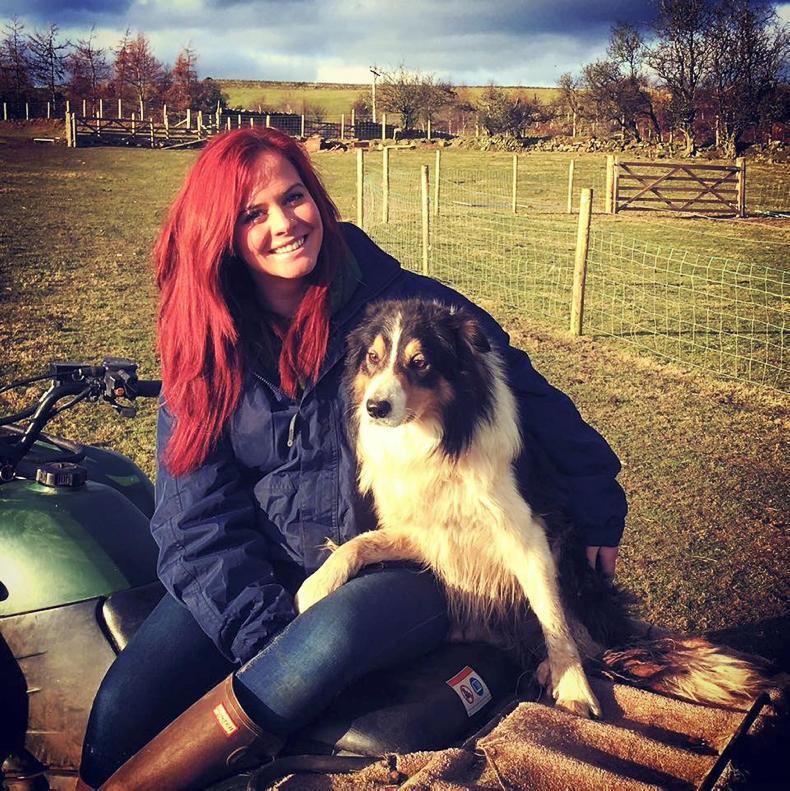
“It’s all about inspiring the public to reconnect with food and the countryside. But you have to be realistic, allow the public to empathise with who we are as farmers. A lot of people are not there to slander you.”
Hannah has built up her following to a whopping 50,000. She says she got to a stage where she had the option to turn “The Red Shepherdess” into a brand or keep to social media only. She took the opportunity to make it a brand and now sells boxes of lamb directly to consumers through it. Butchery and packaging costs her £33/lamb and she sells boxes of half a lamb for £80.
People don’t buy what you do but why you do it
As she says, she is not charging over the odds for her lamb, but at least she has taken the market uncertainty out of sending them to the mart or factory.
“Find the ‘why’. People don’t buy what you do but why you do it. You need that loyalty and trust for people to come back to your business.”
In 2016, Hannah and her parents started ‘Your Natural Leaders’ on her farm. The course teaches people how to work with sheepdogs and focuses on that to develop leadership skills among executive teams.
They ran 12 courses this year at £3,200 per course, 15% of which is net profit. The plan is to grow income from this business to £70,000 next year.
Build a brand and you can sell anything. That is the message from two well-known UK farmers that have diversified their businesses and are selling branded farm produce. People don’t buy what you do, but why you do it, that is according to Wilfred Emmanuel Jones and Hannah Jackson, otherwise known as ‘The Black Farmer’ and ‘The Red Shepherdess’.
Both The Black Farmer and The Red Shepherdess are first and foremost a brand, not a product.
They both came from non-farming backgrounds
Often when farmers look to diversify or add value they try to come up with a product and then try to sell it. However these farmers argue that a strong brand is more important.
They both decided to go directly to the consumer
They both came from non-farming backgrounds and worked for free at one stage along their career path to get to where they wanted. In many ways, their stories are similar but they are of two different generations. They both decided to go directly to the consumer to sell their product, bypassing the retail intermediaries. Arguably, The Red Shepherdess had a better opportunity to do this as she started her business in the digital era when communicating to consumers directly was made easier by social media.

Wilfred Emmanuel Jones - The Black Farmer. \ Odile Evans
Wilfred Emmanuel Jones’ was born in Jamaica, but his family moved to Birmingham when he was an infant. Children raised in his neighbourhood were not expected to do well in life, indeed some of his classmates did end up serving time in prison. By the age of 11, Wilfred had decided that farming was part of his DNA, and he set a goal of buying a farm. From there on out everything he did in life was geared towards being in a position to buy a farm. Wilfred started out by joining the army when he left school at 16, but he said his entrepreneurial personality didn’t fit with the rules and structure of the army. At just 18 years of age he was “dishonourably discharged”. He got kicked out.
I couldn’t buy a farm flipping burgers
So, he went where all “useless people” at the time went; catering college.
“I went to college in the west midlands and loved it. But I couldn’t buy a farm flipping burgers. So I decided I wanted a job as a TV producer and director.”
BBC career
After writing to everyone he could think of in TV, but hearing nothing back, Wilfred decided to work for the BBC security firm for free.
Then he got a job as a cleaner which he did for two years before he was given a three-month contract as a “runner”. Then he became a researcher before moving on to the role of producer and director with the BBC.
“I got to travel the world making programmes about food and drink. I broke in all the big name chefs; Gordon Ramsay, Antony Worrall-Thompson, Brian Turner and James Martin.
“The Oxford-types couldn’t manage these chefs, but I spoke their sort of language, settled disputes out the back.”
Marketing agency
After 15 years in the BBC, Wilfred still wasn’t content.
“The moment you stand still, life goes past you. Those who stand still become a victim of change. At this point I was in my late 30s and I didn’t want to miss any opportunities. So I left the BBC with enough money to pay my mortgage for just three months.
An entrepreneur makes a friend of uncertainty
“Fear makes people prisoners to what I call ‘survival mode’. Living with fear is difficult.
“An entrepreneur makes a friend of uncertainty. Because if there is one thing I have learnt, certainty does not exist in this world.”
So, he set up a food and drink marketing agency, launching some of the biggest brands known today such as Lloyd Grossman sauces and Kettle chips. Ultimately, it was owning his own business that enabled him to buy his farm on the border of Devon and Cornwall.
The locals were not sure what to think of the black man farming down in Devon and suspected that he was growing things that he should not have been. They coined the term ‘The Black Farmer’. When Wilfred decided he was going to sell gluten-free sausages, it was the name that became a brand.
Great brands have a philosophy, a belief system
“You need audacity to be what you want to be. Our culture drags people down. Decide if you want to be or to belong.
“All the market research said that ‘The Black Farmer’ would offend people. Research tells you what people think today, not tomorrow. For that you need vision. When Richard Branson started out, ‘Virgin’ was a risqué thing to say in public.
“Great brands have a philosophy, a belief system. When people know what you stand for you can sell anything.”
Retail
Getting listed in a retailer was not easy. Wilfred launched his product at the start of the internet revolution. He went around giving people samples of gluten-free sausages and if they liked them he asked them to email the supermarkets to list his product.
The tactic worked and now ‘The Black Farmer’ sells a wide range of products including chicken, eggs, crisps, tea and coffee.
Anything that becomes fashionable is because someone had the audacity to make it so
Wilfred’s advice to budding entrepreneurs is not to get caught up in trends. When he launched it was at a time when “organic” was a buzzword and he says he is happy he didn’t go down that route as the market has levelled out.
“Anything that becomes fashionable is because someone had the audacity to make it so. The only measurement of living life is to be able point at failures.”
Wilfred has two life principles:
1 Focus –
“You have to be ruthlessly focused on your goals to be able to get rid of the white noise.”
2 Passion –
“Entrepreneurs have a passion that defies reason and logic and all hurdles life throws at you. Reasonable logic doesn’t make sense.”
To find out more you can read his book Jeopardy; the danger of playing it safe on the path to success.

Hannah Jackson is the farm manager at the 1,000ac Lazonby Estates, Cumbria, England.
Hannah Jackson was raised in Liverpool but had her sights set on farming from a young age. She studied animal behaviour at college and went on to work for the first nine months free of charge on a sheep farm. She used that time to learn as much as she could and openly admits that, for the first while, she didn’t know where to stand when moving sheep or what to do.
I used social media to link with farmers and tell my story
From there, she moved into contract shepherding. So she does a lot of lambing work and uses that to build up money for the year ahead. She has a lot of the same client’s year on year. She runs her own flock on just over 70 acres and works with the farm relief service in the summer months.
“I used social media to link with farmers and tell my story. I had red hair for years so the tag ‘Red Shepherdess’ came from there. The creation of a brand was accidental.”
Hannah shares pictures on a number of social media platforms of her daily life shepherding and she says it is important to show the good with the bad.

“It’s all about inspiring the public to reconnect with food and the countryside. But you have to be realistic, allow the public to empathise with who we are as farmers. A lot of people are not there to slander you.”
Hannah has built up her following to a whopping 50,000. She says she got to a stage where she had the option to turn “The Red Shepherdess” into a brand or keep to social media only. She took the opportunity to make it a brand and now sells boxes of lamb directly to consumers through it. Butchery and packaging costs her £33/lamb and she sells boxes of half a lamb for £80.
People don’t buy what you do but why you do it
As she says, she is not charging over the odds for her lamb, but at least she has taken the market uncertainty out of sending them to the mart or factory.
“Find the ‘why’. People don’t buy what you do but why you do it. You need that loyalty and trust for people to come back to your business.”
In 2016, Hannah and her parents started ‘Your Natural Leaders’ on her farm. The course teaches people how to work with sheepdogs and focuses on that to develop leadership skills among executive teams.
They ran 12 courses this year at £3,200 per course, 15% of which is net profit. The plan is to grow income from this business to £70,000 next year.








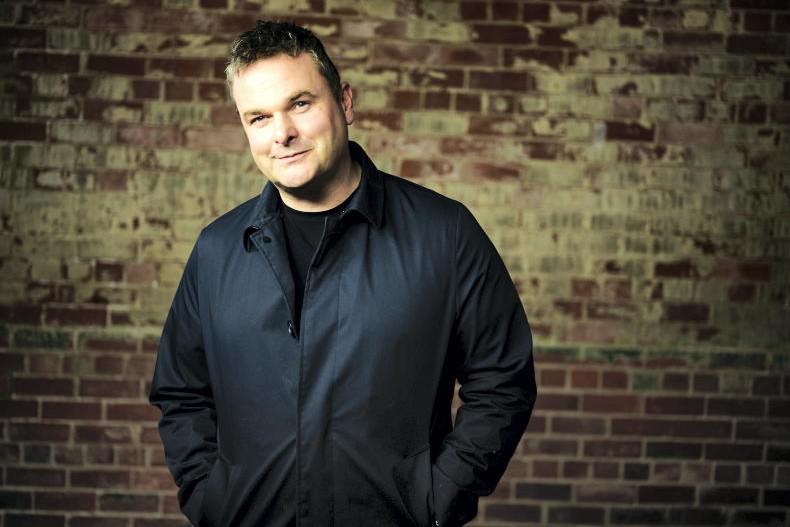

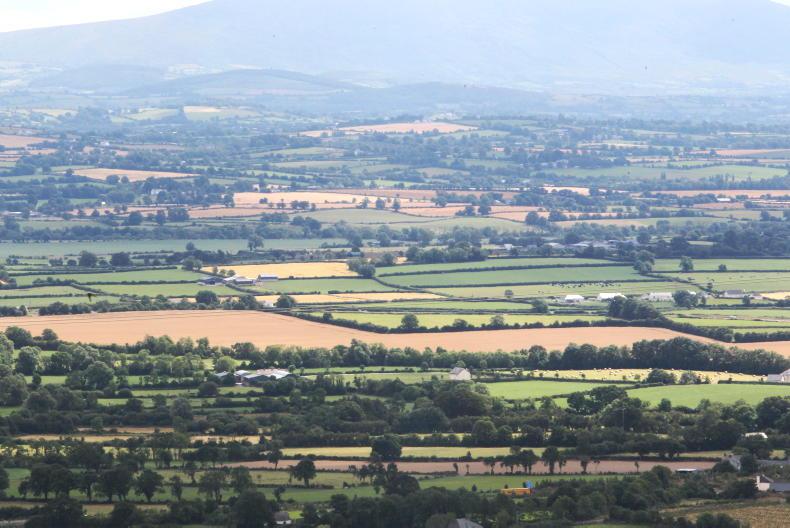
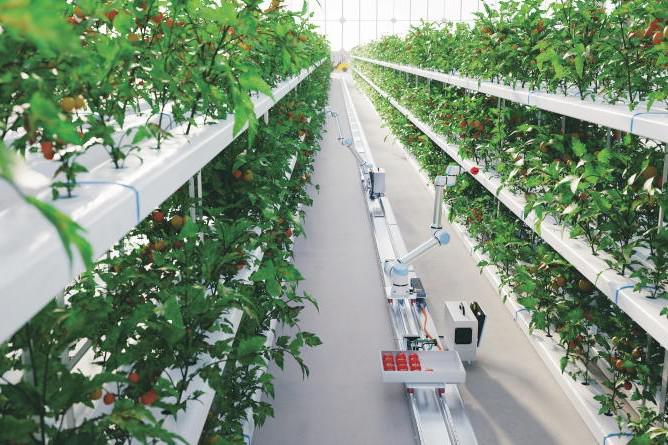
SHARING OPTIONS